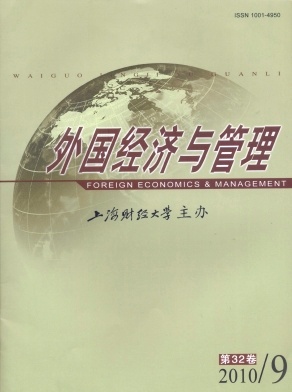无边界职业生涯研究演进探析与未来展望
外国经济与管理 2010 年 第 32 卷第 09 期, 页码:37 - 44
摘要
参考文献
摘要
本文从无边界职业生涯概念的提出、概念的多角度诠释、研究视野的拓展、概念反思等方面对现有文献进行了系统梳理,试图探寻"无边界职业生涯"概念的发展轨迹,厘清对"无边界职业生涯"及相关范畴的认识,并提出了未来的相关研究议题。
[1]Arthur,MB,and Lawrence,B S.Perspectives on environment and career:An introduction[J].Journal of Occupational Behav-iour,1984,5(1):1-8.
[2]Arthur,M B.The boundaryless career:A new perspective for organizational inquiry[J].Journal of Organizational Behavior,1994,15(4):295-306.
[3]Defillippi,RJ,and Arthur,MB.The boundaryless career:Acompetency-based perspective[J].Journal of Organizational Behav-ior,1994,15(4):307-324.
[4]Bird,A.Careers as repositories of knowledge:Anewperspective on boundaryless careers[J].Journal of Organizational Behavior,1994,15(4):325-344.
[5]Miner,A S,and Robinson,D F.Organizational and populationlevel learning as engines for career transitions[J].Journal of Or-ganizational Behavior,1994,15(4):345-364.
[6]Mirvis,P H,and Hall,D T.Psychological success andthe boundaryless career[J].Journal of Organizational Behavior,1994,15(4):365-380.
[7]Arthur,MB,and Rousseau,D M.The boundaryless career as a newemployment principle[A].in Arthur,MB,and Rousseau,D M(Eds.).The boundaryless career:Anewemployment principle for a neworganizational era[C].New York:Oxford University Press,1996.
[8]Arthur,MB,Claman,P H,and Defillippi,RJ.Intelligent enterprise,intelligent careers[J].The Academy of Management Ex-ecutive,1995,9(4):7-22.
[9]Hall,D T.Careers in organizations[M].Glenview,IL:Scott,Foresman,1976.
[10]Hall,D T.The protean career:Aquarter-century journey[J].Journal of Vocational Behavior,2004,65(1):1-13.
[11]Briscoe,J P,and Hall,D T.The interplay of boundarylessness and protean careers:Combinations andi mplications[J].Journalof Vocational Behavior,2006,69(1):4-18.
[12]Briscoe,J P,Hall,D T,and Frautschy De Muth,R L.Protean and boundaryless careers:An empirical exploration[J].Journalof Vocational Behavior,2006,69(1):30-47.
[13]Eby,L T,Butts,M,and Lockwood,A.Predictors of successinthe era of the boundaryless career[J].Journal of Organization-al Behavior,2003,24(6):689-708.
[14]Arthur,MB,Khapova,S N,and Wilderom,C P M.Career success in a boundaryless world[J].Journal of Organizational Be-havior,2005,26(2):177-202.
[15]Gunz,HP,Evans,M G,and Jalland,R M.Career boundaries in a boundaryless world[A].in Peiperl,M A,Arthur,MB,Goffee,R,and Morris,T(Eds.).Career frontiers[C].New York:Oxford University Press,2000.
[16]Feldman,D C,and Ng,T W H.Careers:Mobility,embeddedness,and success[J].Journal of Management,2007,33(3):350-377.
[17]Lazarova,M,and Taylor,S.Boundaryless careers,social capital,and knowledge management:I mplications for organizationalperformance[J].Journal of Organizational Behavior,2009,30(1):119-139.
[18]Zeitza,G,Blaua,G,and Fertiga,J.Boundaryless careers and institutional resources[J].The International Journal of HumanResource Management,2009,20(2):372-398.
[19]Rodrigues,R A,and Guest,D.Have careers become boundaryless-[J].Human Relations,2010,3:1-19.
[20]Higgins,MC.Changing careers:The effect of social context[J].Journal of Organizational Behavior,2001,22(6):595-618.
[2]Arthur,M B.The boundaryless career:A new perspective for organizational inquiry[J].Journal of Organizational Behavior,1994,15(4):295-306.
[3]Defillippi,RJ,and Arthur,MB.The boundaryless career:Acompetency-based perspective[J].Journal of Organizational Behav-ior,1994,15(4):307-324.
[4]Bird,A.Careers as repositories of knowledge:Anewperspective on boundaryless careers[J].Journal of Organizational Behavior,1994,15(4):325-344.
[5]Miner,A S,and Robinson,D F.Organizational and populationlevel learning as engines for career transitions[J].Journal of Or-ganizational Behavior,1994,15(4):345-364.
[6]Mirvis,P H,and Hall,D T.Psychological success andthe boundaryless career[J].Journal of Organizational Behavior,1994,15(4):365-380.
[7]Arthur,MB,and Rousseau,D M.The boundaryless career as a newemployment principle[A].in Arthur,MB,and Rousseau,D M(Eds.).The boundaryless career:Anewemployment principle for a neworganizational era[C].New York:Oxford University Press,1996.
[8]Arthur,MB,Claman,P H,and Defillippi,RJ.Intelligent enterprise,intelligent careers[J].The Academy of Management Ex-ecutive,1995,9(4):7-22.
[9]Hall,D T.Careers in organizations[M].Glenview,IL:Scott,Foresman,1976.
[10]Hall,D T.The protean career:Aquarter-century journey[J].Journal of Vocational Behavior,2004,65(1):1-13.
[11]Briscoe,J P,and Hall,D T.The interplay of boundarylessness and protean careers:Combinations andi mplications[J].Journalof Vocational Behavior,2006,69(1):4-18.
[12]Briscoe,J P,Hall,D T,and Frautschy De Muth,R L.Protean and boundaryless careers:An empirical exploration[J].Journalof Vocational Behavior,2006,69(1):30-47.
[13]Eby,L T,Butts,M,and Lockwood,A.Predictors of successinthe era of the boundaryless career[J].Journal of Organization-al Behavior,2003,24(6):689-708.
[14]Arthur,MB,Khapova,S N,and Wilderom,C P M.Career success in a boundaryless world[J].Journal of Organizational Be-havior,2005,26(2):177-202.
[15]Gunz,HP,Evans,M G,and Jalland,R M.Career boundaries in a boundaryless world[A].in Peiperl,M A,Arthur,MB,Goffee,R,and Morris,T(Eds.).Career frontiers[C].New York:Oxford University Press,2000.
[16]Feldman,D C,and Ng,T W H.Careers:Mobility,embeddedness,and success[J].Journal of Management,2007,33(3):350-377.
[17]Lazarova,M,and Taylor,S.Boundaryless careers,social capital,and knowledge management:I mplications for organizationalperformance[J].Journal of Organizational Behavior,2009,30(1):119-139.
[18]Zeitza,G,Blaua,G,and Fertiga,J.Boundaryless careers and institutional resources[J].The International Journal of HumanResource Management,2009,20(2):372-398.
[19]Rodrigues,R A,and Guest,D.Have careers become boundaryless-[J].Human Relations,2010,3:1-19.
[20]Higgins,MC.Changing careers:The effect of social context[J].Journal of Organizational Behavior,2001,22(6):595-618.
引用本文
吕杰, 徐延庆. 无边界职业生涯研究演进探析与未来展望[J]. 外国经济与管理, 2010, 32(9): 37–44.
导出参考文献,格式为:





 5664
5664  296
296

